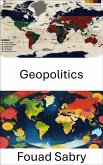Introduction
Explore the fascinating realm of political aggression in Aggressionism, part of the "Political Science" series. This book delves into the theory and practice of aggression in politics, examining its impact on global and domestic power dynamics. Essential for those wanting to understand modern political forces.
Chapters Brief Overviews
1: Aggressionism - Introduces aggressionism, its theory, and political relevance.
2: Konrad Lorenz - Discusses Lorenz's views on innate aggression in politics.
3: On Aggression - Analyzes aggression as a psychological and social phenomenon.
4: Lebensraum - Studies Lebensraum and its role in Nazi expansionism.
5: Killer Ape Theory - Explores the theory and its political implications.
6: Communism - Investigates aggression in communist strategies.
7: Nazism - Examines Nazism's aggressive political tactics.
8: History of Evolutionary Psychology - Links evolutionary psychology to political aggression.
9: Comparison of Nazism and Stalinism - Compares their aggressive political practices.
10: Amity-enmity Complex - Explores political alliances and conflicts through the amity-enmity lens.
11: Marxism-Leninism - Analyzes Marxism-Leninism's aggression in politics.
12: Social Darwinism - Examines how Social Darwinism shaped aggressive policies.
13: Anti-Slavic Sentiment - Investigates anti-Slavic aggression and its impact.
14: Social Effects of Evolutionary Theory - Discusses evolution's influence on political aggression.
15: Foreign Relations of the Soviet Union - Examines the Soviet Union's aggressive foreign policies.
16: New Soviet Man - Explores the concept of the New Soviet Man and aggression.
17: Criticism of Atheism - Links atheism and aggressive secular politics.
18: Religious Views of Adolf Hitler - Investigates how Hitler's religious views fueled aggression.
19: Jewish Bolshevism - Examines the myth of Jewish Bolshevism in aggressive agendas.
20: Socialist Patriotism - Looks at socialist patriotism and its aggressive nationalism.
21: World Communism - Studies World Communism's aggressive global strategies.
Conclusion
Aggressionism offers deep insights into how aggression shapes political power. It's a valuable resource for professionals, students, and political science enthusiasts. With its rich content, this book is a must-read for understanding the influence of aggression in politics today.
Explore the fascinating realm of political aggression in Aggressionism, part of the "Political Science" series. This book delves into the theory and practice of aggression in politics, examining its impact on global and domestic power dynamics. Essential for those wanting to understand modern political forces.
Chapters Brief Overviews
1: Aggressionism - Introduces aggressionism, its theory, and political relevance.
2: Konrad Lorenz - Discusses Lorenz's views on innate aggression in politics.
3: On Aggression - Analyzes aggression as a psychological and social phenomenon.
4: Lebensraum - Studies Lebensraum and its role in Nazi expansionism.
5: Killer Ape Theory - Explores the theory and its political implications.
6: Communism - Investigates aggression in communist strategies.
7: Nazism - Examines Nazism's aggressive political tactics.
8: History of Evolutionary Psychology - Links evolutionary psychology to political aggression.
9: Comparison of Nazism and Stalinism - Compares their aggressive political practices.
10: Amity-enmity Complex - Explores political alliances and conflicts through the amity-enmity lens.
11: Marxism-Leninism - Analyzes Marxism-Leninism's aggression in politics.
12: Social Darwinism - Examines how Social Darwinism shaped aggressive policies.
13: Anti-Slavic Sentiment - Investigates anti-Slavic aggression and its impact.
14: Social Effects of Evolutionary Theory - Discusses evolution's influence on political aggression.
15: Foreign Relations of the Soviet Union - Examines the Soviet Union's aggressive foreign policies.
16: New Soviet Man - Explores the concept of the New Soviet Man and aggression.
17: Criticism of Atheism - Links atheism and aggressive secular politics.
18: Religious Views of Adolf Hitler - Investigates how Hitler's religious views fueled aggression.
19: Jewish Bolshevism - Examines the myth of Jewish Bolshevism in aggressive agendas.
20: Socialist Patriotism - Looks at socialist patriotism and its aggressive nationalism.
21: World Communism - Studies World Communism's aggressive global strategies.
Conclusion
Aggressionism offers deep insights into how aggression shapes political power. It's a valuable resource for professionals, students, and political science enthusiasts. With its rich content, this book is a must-read for understanding the influence of aggression in politics today.
Dieser Download kann aus rechtlichen Gründen nur mit Rechnungsadresse in A, B, BG, CY, CZ, D, DK, EW, E, FIN, F, GR, H, IRL, I, LT, L, LR, M, NL, PL, P, R, S, SLO, SK ausgeliefert werden.









